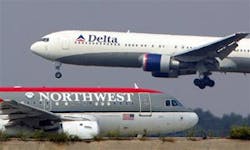Their bankruptcy filings behind them, Delta and Northwest began a lengthy and costly road to recovery on Thursday that will likely include cutting employee rolls, pensions and routes. In the end, if they survive, the nation's third- and fourth-largest airlines will be smaller and may look more like the discount rivals that helped send them into bankruptcy.
That perspective by analysts, bankruptcy experts and academics was underscored Thursday as Atlanta-based Delta Air Lines Inc. and Eagan, Minn.-based Northwest Airlines Corp. sought to reject certain aircraft leases. In Delta's case, it also asked a New York bankruptcy judge to allow it to abandon some properties and prevent utilities from turning off its power.
"What are they going to look like? They are going to look like Southwest or JetBlue," said Manchester, N.H., bankruptcy and restructuring expert Dan Sklar, referring to the low-cost carriers.
David LeMay, an attorney who worked on Continental's bankruptcy in the early 1990s, said that airline raised cash in bankruptcy by selling a valuable trans-Pacific route and a terminal it was building at LaGuardia airport in New York.
"I'm sure that both Delta and Northwest will be looking very, very hard at what is absolutely essential to keep and what can be sold," he said.
While bankruptcy gives the airlines more leverage, it doesn't address one of the companies' fundamental problems _ not enough revenue.
"There's no motion you can make in bankruptcy court that says, 'Please put $20 million in the checking account this week,'" LeMay said. "People have this impression that in bankruptcy you can do whatever you please, but that's really not true at all."
In Northwest's case, the airline will likely press its pilots to change rules that limit its regional passenger service, said airline analyst Ray Neidl at Calyon Securities in New York. Regional flying is important to both carriers. But Northwest, with its large Midwest presence, already does more flights at small airports than any other carrier. Shifting more of those flights to its regional partners will help Northwest get profitable again, Neidl said.
And Delta will change its system even more than Northwest, Neidl said. "They might try to become more international-oriented. Domestically, I'm thinking they will shrink," he said.
Delta also will likely look for savings at its in-house discount carrier, Song. Neidl said Delta has claimed that Song is already cheap to operate, but others haven't been so sure.
"If it's not cheap now, I believe Delta will make it cheap," he said.
To do that, job, pay and benefit cuts are almost a certainty. The chiefs of both companies said after their filings Wednesday that more job cuts are expected. Employee pensions also are in danger.
Delta said it does not plan to make the next scheduled contribution to its pension fund. Northwest had a $65 million pension payment due Thursday, but said in a regulatory filing Tuesday that a claim against its assets for nonpayment could be avoided if it filed for bankruptcy first. Some analysts expect both airlines to terminate their pensions and dump the responsibility on the federal government like UAL Corp.'s United Airlines has done in its bankruptcy case. Northwest Chief Executive Doug Steenland has said he wants to avoid that.
Delta and Northwest have been seeking pension-law changes that would let them spread out payments to their pensions, but the relief they may ultimately get may not be enough to save the plans. The head of the Pension Benefit Guaranty Corp. said Thursday that Delta and Northwest have a responsibility to meet their pension funding requirements. The federal agency said that Delta's pension is underfunded by $10.6 billion and Northwest's by $5.7 billion.
At a bankruptcy court hearing Thursday, Northwest asked for permission to pay $55 million to vendors for services during its mechanics strike. It was the first acknowledgment of the costs of the strike, which began Aug. 20. Delta also had a bankruptcy court hearing to discuss procedural matters.
NWA says in filing that it wants to return 13 aircraft immediately, and it has designated 102 more for potential removal.
It's not clear how helpful the federal government and the airlines' respective state governments can be during Delta's and Northwest's bankruptcy, though some lawmakers have said they will try.
When asked Thursday if his state intends to put together another Northwest bailout package, Minnesota Gov. Tim Pawlenty said, "Given how far they're in debt, it is really beyond the capacity of the government to save the day." Delta's debt stands at $28.3 billion; Northwest's at $17.92 billion. Some Georgia lawmakers plan to meet next week to discuss how the state can help Delta.
As for customers, some industry observers believe service will be improved at both airlines after the bankruptcy process concludes.
"Flying might not be as convenient, but overall I don't think customers are going to notice that much difference and two or three years from now they may find they have better service _ service with a smile," said William Rochelle, a bankruptcy lawyer in New York.
Michael Lapre, an assistant professor of management at Vanderbilt University who has done airlines research, said quality will remain very important for Delta and Northwest as the carriers seek to restructure their debts.
"Either they get their act together or there will be some sort of a shake-up," he said.
In the end, there even could be some mergers involving the big legacy carriers, though some believe regulatory approval could make that proposition difficult. But with persistently high fuel costs, some believe consolidation is inevitable.
"We just have one catastrophe after another in the industry," Rochelle said. "I'm not sure any of them have the capacity to respond on their own."
Shares of Delta rose 10 cents, or 14 percent, to 81 cents in late trading on the New York Stock Exchange, while Northwest shares fell 98 cents, or 52 percent, to 89 cents on the Nasdaq Stock Market.





